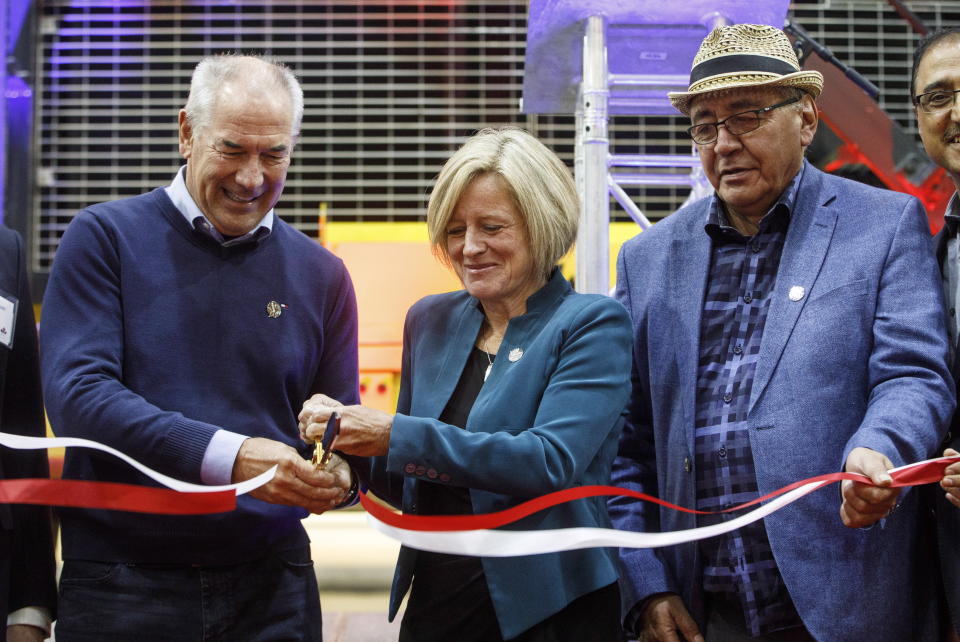Want to invest like an oil trader? Here's how

Suncor Energy Inc. (SU.TO) CEO Steve Williams cut the ribbon on its $17-billion Fort Hills oilsands mine on Monday, marking what some industry observers expect is the last mega-project to be unveiled in Canada for a long time.
Heavy oil production is on the rise in Western Canada. Means to move it to market have not kept pace. The situation is weighing down Western Canadian Select (WCS) against the U.S. benchmark, West Texas Intermediate (WTI) — a discount now in the mid-US$30 range.
Last week, Williams told a room full of investors that he will need to see “physical progress on the ground,” a.k.a. new pipeline capacity, in order to approve any new production.
For Auspice Capital CEO Tim Pickering, it’s all a sign to shun energy shares and start investing like a commodities trader.
“What Steve Williams is saying is absolutely accurate,” he told Yahoo Canada Finance. “We’re getting down to the bottom of that range near $30 where producers are going to pull back on supply. When the supply gets pulled back, the price of crude goes up further.”
Auspice claims to offer investors the purest exposure to the discounted price of Canadian oil through its Canadian Crude Oil Index ETF (CCX.TO). The fund tracks the company’s Canadian Crude Index, described as “a simple, transparent and liquid benchmark for oil produced in Canada.”
Canadian Crude Oil shares have increased about 14 per cent year-to-date, closing at C$10.27 per share on Monday.
Pickering, a former vice president of trading for Shell North America and energy derivatives trader at TD Securities, said the ETF provides investors direct exposure to heavy crude, formally the exclusive domain of wholesale energy traders.
“(It’s) the opportunity to have access just like I had at Shell,” he said. “Access to the Canadian crude as a commodity is an incredible edge.”
WCS prices have taken it on the chin this summer. Western Canadian oil inventories rose 4.3 million barrels to a record high of 36.3 million barrels the week ended Aug. 31, according to research firm Genscape.
The growing glut has been exacerbated by the restart of the Syncrude project, following a complete shutdown in June. Production at Fort Hills is steadily ramping up as well.
For Pickering, the “punch in the face” has been the cost of moving oil to market. Pricier crude-by-rail exports from Canada set another record in June, rising to 204,558 barrels per day, according to the National Energy Board.
“Right now it costs between US$8 and $21 (per barrel) to move Canadian crude to the U.S. gulf. That’s a lot,” he said. “The handicap that we play with is significant.”
Last month’s federal court decision to halt construction on Kinder Morgan’s Trans Mountain pipeline until the impacts of increased tanker traffic are studied and consultation with Indigenous groups is improved, potentially setting that project back for years.
Bleak as the outlook for new pipelines in Alberta may seem, Pickering is convinced it’s a matter of when, not if, more steel gets put in the ground to relieve the long-term pressure on oil producers.
“This problem will get solved. It will either get solved under the current Trudeau administration, or it will get solved when Trudeau gets knocked out, because Canadians are not going to put up with this much longer,” he said. “We’ve made a decision democratically to extract a resource from the ground . . . yet we haven’t build the infrastructure to get a globally fair price for it. Think of how stupid that is.”
Pickering encourages investors to remember that the market for oil is bigger than one country’s pipelines and politics. He expects a rising tide of global demand will lift Canada’s boat, and reward those who bought Canadian oil on the cheap.
“Historically as global oil rallies the discount actually narrows as U.S. refineries chase the cheap heavy feedstock they need for their refineries,” he said. “What would I not want to buy the most discounted oil on the planet?”
Download the Yahoo Finance app, available for Apple and Android.

 Yahoo Finance
Yahoo Finance 
